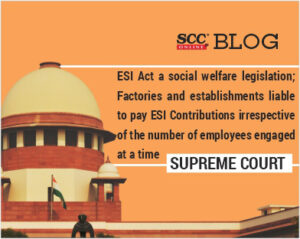Supreme Court: While exercising its appellate jurisdiction, the division bench of M.R. Shah* and C.T. Ravikumar J.J., upheld the order passed by the Employees Insurance Court (‘EI Court’) which had dismissed the challenge filed by the respondent herein against the demand notice issued by the appellant herein and held that Section 1(6) of the ESI Act, 1948 (‘ESI Act’) shall be applicable even with the respect to those establishments which were established prior to 1989 and the ESI Act shall be applicable irrespective of the number of persons employed at any time which falls below the limit specified under the ESI Act.
Factual Matrix of the case
Employees State Insurance Corporation (‘ESI Corporation/Appellant’) challenged the order passed by the Telangana High Court which had set aside the order passed by the EI Court stating that the Section 1(6) of the ESI Act could not be made applicable retrospectively.
The appellant had issued a demand notice to the respondent who was running a Cinema Theatre with less than 20 employees without paying the ESI contributions. The same was challenged by the respondent in the EI Court stating that it was not covered under the provision of the ESI Act which came into effect in 1989.
The EI Court, however, confirmed the demand notices which was the subject matter of the appeal before the Telangana High Court.
The cinema theater had then contended that Section 1(6) of the ESI Act was inserted in October 1989 which could not be made applicable retrospectively. On the other hand, ESI Corporation had contended that the ESI Act was a social welfare legislation, thus, greater amplitude was required to be given notwithstanding the fact that the number of persons engaged therein was less than the prescribed number.
The High Court, accordingly, allowed the appeal agreeing with the contention of the cinema theater that the above stated section could not be made applicable retrospectively.
Issue
-
Whether with respect to the demand notices post October 1989, a factory or an establishment, established prior to October 1989 shall be governed by the ESI Act notwithstanding the number of persons employed at any time falls below the limit specified under the ESI Act?
-
Whether the demand notices for the period after October 1989 i.e., from the date by which Section 1 (6) of the ESI Act came to be inserted, be said that it could have been applied retrospectively?
Court Analysis
The Court was of the opinion that since the ESI Act was a social welfare legislation, any interpretation which would lean in favour of the beneficiary should be given.
The Court, after considering catena of earlier decisions under the ESI Act, held that ESI Act be given liberal interpretation in such a manner so that social security can be given to the employees.
The Supreme Court stated that prior to insertion of Sub-section (6) of Section 1 of the ESI Act, only those establishments or factories engaging more than 20 employees were governed by the ESI Act but after the amended provision in 1989, a factory or establishment would be governed by the ESI Act irrespective of the number of persons employed. Therefore, on and after October 1989, irrespective of the number of persons employed, a factory or an establishment shall be governed by the ESI Act resultantly making the demand notices issued by the ESI Corp for the period after October 1989 valid.
Supreme Court further stated that the Telangana High Court erred in setting aside the demand notice for the period after October 1989 and that the amended Section 1 (6) was applied retrospectively. It was of the view that only in the case of demand notice for the period prior to inserting Section 1(6) of the ESI Act, it could be said that the same provision has been applied retrospectively.
Therefore, the Supreme Court while setting aside the order of the High Court and restoring the demand notice issued by the appellant for the period post October 1989 and held that Section 1(6) of the ESI Act shall be applicable even with the respect to those establishments which were established prior to October 1989 and the ESI Act shall be applicable irrespective of the number of persons employed below the limit specified under the ESI Act.
*Judgment authored by: Justice M.R. Shah.
[ESI Corporation v. Radhika Theater, 2023 SCC OnLine SC 64, decided on 20-01-2023]
Advocates who appeared in this case :
Advocate Mahesh Srivastava.
*Simran Singh, Editorial Assistant has summated the brief.

